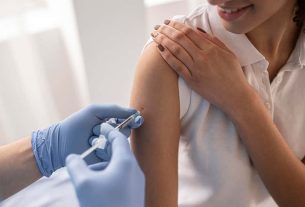Orthorexia is a disorder characterized by excessive concern about healthy eating, in which the person consumes only pure foods, without pesticides, contaminants or products of animal origin, in addition to only consuming foods with a low glycemic index, low fat and sugar content. .
Another characteristic of this syndrome is excessive concern about how food is prepared, taking excessive care not to add too much salt, sugar or fat.
This excessive concern with healthy eating causes the diet to be very restricted and little varied, leading to weight loss and nutritional deficiencies. It also interferes with the person’s personal life, as they are no longer able to eat outside the home, so they have more control over how the food is prepared.

Main symptoms
The main symptoms of orthorexia are:
- Excessive concern with the quality of the food that will be consumed and how it is prepared;
- Feelings of guilt and anxiety when eating something that is considered unhealthy;
- Dietary restrictions that increase over time;
- Absolute exclusion of foods considered impure, such as those containing dyes, preservatives, trans fats, sugar and salt;
- Consumption of only organic products, excluding transgenic foods and foods containing pesticides from the diet;
- Exclusion of several food groups from the diet, mainly meat, milk and dairy products, fats and carbohydrates.
It is normal for people with orthorexia to never go out to eat, often declining invitations from friends and family. It may also happen that the person accepts the invitations, but brings their own food.
How to confirm the diagnosis
The diagnosis of orthorexia must be made by a doctor or nutritionist through a detailed assessment of eating habits, to understand whether there are important dietary restrictions and excessive preoccupation with food.
It is also important to have an evaluation by a psychologist in order to assess the behavior and whether there are any triggering factors.
Possible complications
The consequences of orthorexia are related to inadequate and restricted nutrition, in addition to psychological changes, the main ones being:
- Malnutrition;
- Excess or deficiency of vitamins, depending on the diet adopted;
- Anemia;
- Weight loss;
- Low pressure;
- Osteoporosis;
- Thyroid problems;
- Hormonal changes;
- Weakening of the immune system;
- Cardiovascular problems;
- Infertility;
- Psychological changes, such as depression, anxiety and obsessive disorders.
Furthermore, the person is more likely to become socially isolated, in addition to being less careful with their professional activities, for example, due to more time spent on eating.
When treatment is needed
The treatment of orthorexia nervosa must be carried out with medical supervision, and in some cases psychological support is also necessary. It is common to need to take nutritional supplements in cases where there are deficiencies in nutrients, such as vitamins and minerals, or the presence of diseases such as anemia.
In addition to medical monitoring, family support is also essential so that orthorexia can be identified and overcome, and so that a healthy diet can be followed without putting the patient’s health at risk.
It is also important to remember that orthorexia is different from vigorexia, which is when there is an excessive search for physical activity to have a body full of muscles. Understand what vigorexia is and how to identify it.
Bibliography
- Ramon Bonet. Orthorexia. ELSEVIER. 2016
- TURNER, Pixie G.; LEFEVRE, Carmen E. Instagram use is linked to increased symptoms of orthorexia nervosa. Eat Weight Disord. Vol 22. 277-284, 2017
- PENAFORTE, Fernanda RO et al. Orthorexia nervosa in nutrition students: associations with nutritional status, body satisfaction and period studied. J Bras Psychiatr. Vol 67. 1 ed; 18-24, 2018
- JUNIOR, Luiz Alberto SS et al. ORTHOREXIA NERVOSA AND OBSESSIVE-COMPULSIVE DISORDER: WHAT IS THE RELATIONSHIP?. Hospital Psychology. Vol 13. 2 ed; 47-63, 2015

Sign up for our newsletter and stay up to date with exclusive news
that can transform your routine!
Warning: Undefined array key "title" in /home/storelat/public_html/wp-content/plugins/link-whisper-premium/templates/frontend/related-posts.php on line 12
Warning: Undefined array key "title_tag" in /home/storelat/public_html/wp-content/plugins/link-whisper-premium/templates/frontend/related-posts.php on line 13




